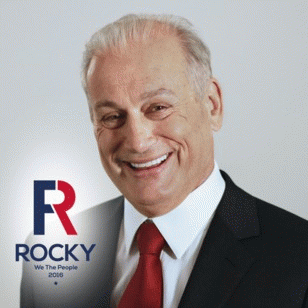e former New Mexico Gov. Gary Johnson has received the lion's share of the mainstream media coverage provided to third-party candidates in this highly volatile and unpredictable presidential campaign -- much of it making a complete fool of himself -- several other independent and minor-party aspirants for the White House have struggled for even a small fraction of the attention undeservedly heaped on the seemingly somnolent and gaffe-prone Libertarian Party nominee.
One of those is Rocky De La Fuente, a doggedly determined and largely self-funded candidate seeking to open the political process and restore genuine democracy in the United States.
He's probably the best kept secret in this year's presidential sweepstakes.
With little publicity or fanfare, the 61-year-old De La Fuente has quietly scratched and clawed his way onto the ballot in no fewer than twenty states this autumn -- and most likely would have been on the ballot in at least half the states in the country were it not for a few minor technicalities in states like Washington and New York, as well as antiquated and arguably unconstitutional "sore loser" laws in Alabama, Arkansas and Pennsylvania.
Reminiscent of the late Eugene McCarthy's little-noticed independent bid for the White House in the year of America's Bicentennial -- "The Bloodless Revolution of 1976," as McCarthy's young lawyers John C. Armor and Philip L. Marcus described it -- De La Fuente is running to open the political process in this country and to create greater awareness of how the political system has been deliberately rigged to protect the two-party stranglehold on American politics while severely limiting voter choice.
Like "Clean Gene" some forty years ago, De La Fuente hopes to knock down a myriad of barriers deliberately put in place to thwart candidates running outside the duopoly. In 1976, McCarthy's legal team struck down unfair and unconstitutional ballot access laws in at least sixteen states. Like the former Minnesota senator, De La Fuente has already filed at least eleven ballot access lawsuits pertaining to this year's general election, including legal challenges to the burdensome and discriminatory number of signatures required for an independent or minor-party candidate for president in California, North Carolina, Oklahoma and Texas.
According to ballot access expert Richard Winger, the longtime publisher of Ballot Access News, De La Fuente's lawsuit in the Lone Star State also addresses the state's early filing deadline and its sore loser law as applied to candidates who ran in the Texas presidential primary.
"The deck is stacked against anyone who is not a member of the politically elite," says the amiable first-generation Mexican-American candidate.
He's speaking from firsthand experience. Earlier this year, the savvy San Diego businessman challenged Hillary Clinton and Bernie Sanders in no fewer than forty Democratic primaries and caucuses and in doing so became the first candidate to ever qualify for the presidential primary ballot in Michigan and possibly North Carolina via the petition method, an arduous task that required obtaining a minimum of 12,000 valid signatures in the former state and more than 10,000 valid signatures in North Carolina, a state with some of the country's strictest ballot access requirements. Remarkably, De La Fuente did the same thing in Massachusetts.
Though he met all three of those difficult hurdles -- he submitted more than 20,000 petition signatures in Michigan, turned in 18,757 signatures in the Tar Heel State and obtained the necessary 2,500 valid signatures in Massachusetts -- Clinton, Sanders and Maryland's Martin O'Malley, the latter of whom dropped out of the Democratic contest faster than one could say "Rocky De La Fuente," didn't need a single signature in those three states because they were generally recognized as presidential candidates by the national news media and had been given their party's official seal of approval.
Not surprisingly, De La Fuente was also shut out of the televised Democratic presidential debates, a fact he squarely blames on the Debbie Wasserman Schultz-led Democratic National Committee (DNC). "They want Hillary to be their next queen," he quipped while campaigning in Raleigh, North Carolina.
De La Fuente, incidentally, was the first person to call for Wasserman-Schultz's resignation as head of the DNC, long before Vermont's Bernie Sanders called for her ouster.
As a result of that painstakingly burdensome and expensive experience, the unassuming and mild-mannered De La Fuente, a deep-pocketed political "outsider," realized just how unfair the nation's entire electoral system really is, how the entire process is intended to completely stymie a political newcomer like himself.
He learned the hard way, but he learned quickly, which is precisely why he decided to remain in the race as a third-party candidate through November.
Unlike Rocky, most candidates would have given up the ghost long before now.
An avid chess player who thrives on simultaneously outwitting his opponents on multiple chessboards, the soft-spoken De La Fuente also waged a somewhat imaginative bid for Florida's Democratic U.S. Senate nomination earlier this summer, sandwiching that last-minute candidacy in his adopted state between his earlier bid for the Democratic presidential nomination and his current third-party quest for the White House.
(Note: You can view every article as one long page if you sign up as an Advocate Member, or higher).






